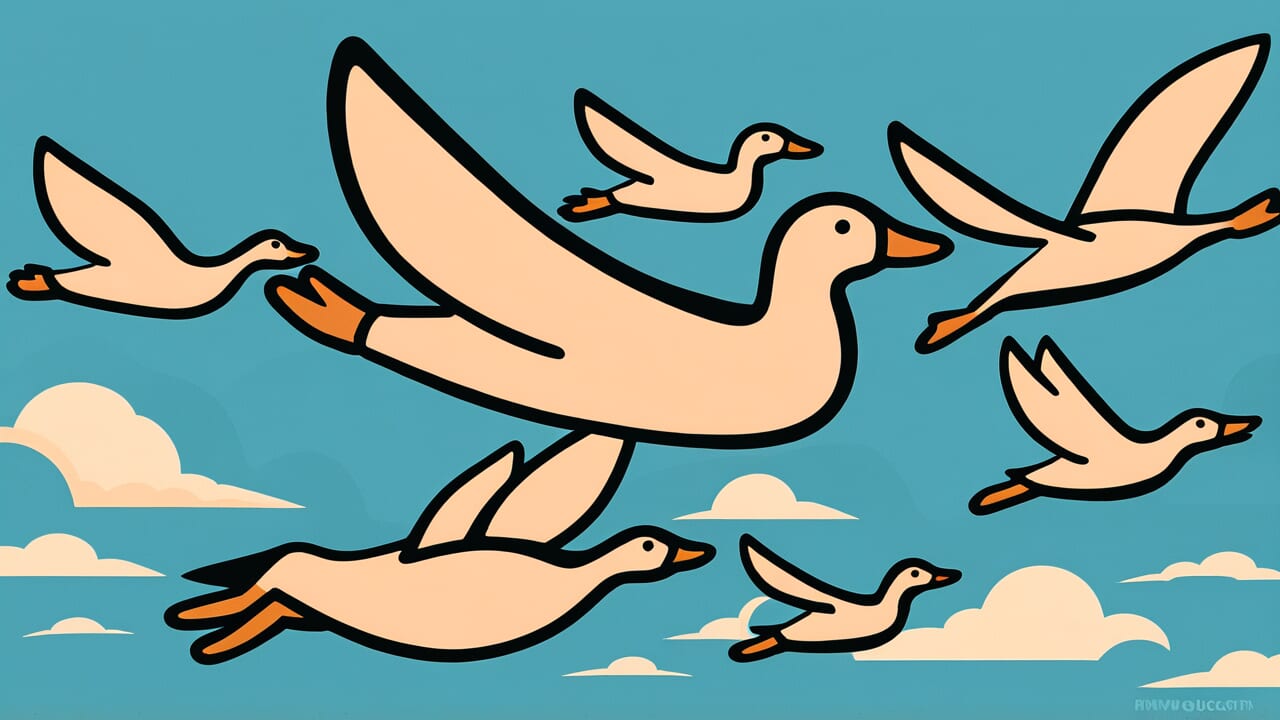How to Read “The geese that were behind become the ones in front”
Ato no kari ga saki ni naru
Meaning of “The geese that were behind become the ones in front”
“The geese that were behind become the ones in front” means that someone who came later gets promoted or succeeds before those who came earlier.
This phrase describes situations in organizations or groups where juniors or newcomers get promoted faster than seniors or those who joined first.
It’s not always used negatively. The proverb objectively describes how ability, talent, or changing times can create results that differ from the original order of entry.
People use this proverb because it conveys the situation more vividly than simply saying “overtaken.” The concrete image of flying geese makes the message more memorable.
In modern society, seniority systems are no longer absolute. Merit-based and performance-based evaluations have become more important, making this phenomenon quite common.
The proverb expresses a fair aspect of competitive society. Those who start first don’t necessarily finish first.
Origin and Etymology
The exact origin of this proverb isn’t clearly documented in historical texts. However, we can make interesting observations from how the phrase is constructed.
Geese have been familiar to Japanese people since ancient times as migratory birds. In autumn, flocks of geese fly from the continent to Japan.
These geese are known for flying in beautiful V-shaped formations. This formation has a clear order.
The lead goose faces the most wind resistance, while geese further back can fly more easily.
This proverb likely compares the changing order of geese formations to promotion and success in human society.
Normally, the goose that departed first should be in front. But sometimes a goose that came later overtakes others and takes the lead.
This natural phenomenon perfectly expresses the reversal of positions in human society.
Geese have also been featured in waka poetry and haiku as an autumn seasonal word since ancient times. They were deeply rooted in Japanese life.
Their orderly formation flying easily reminded people of social order and hierarchy. That’s why changes in this order left strong impressions on people.
This memorable image likely helped the phrase become established as a proverb.
Usage Examples
- My colleague who joined at the same time became department head. It’s truly “the geese that were behind become the ones in front.”
- My younger brother got married and built a house first. This is exactly “the geese that were behind become the ones in front.”
Universal Wisdom
The proverb “The geese that were behind become the ones in front” contains a timeless truth about the mismatch between order and results in life.
In human society, the order you reach the starting line doesn’t always match the order you reach the goal.
Being born first or starting first doesn’t guarantee an advantage. This reality gives hope to some people and brings anxiety or frustration to others.
Why was this proverb created and passed down through generations? Because humans instinctively value “order” and “hierarchy.”
In cultures that respect elders and honor seniors, moments when this order is overturned leave strong impressions on people’s hearts.
Surprise, envy, jealousy, or admiration. Amid these swirling emotions, people needed to name this phenomenon.
At the same time, this proverb reflects both the fairness and unfairness of life.
In societies where effort and talent are properly evaluated, even latecomers can take the lead. That’s hope.
But on the other hand, those who worked hard first may not always be rewarded. That’s life’s harshness.
This proverb quietly but surely conveys both sides of this reality.
When AI Hears This
When geese fly in V-formation, vortices form at the wingtips of the lead goose. These create updrafts diagonally behind and above.
These updrafts are called “wingtip vortices.” Research confirms that following geese can save about 30 percent of their flapping energy by riding these currents.
In other words, geese further back can conserve more energy.
What’s interesting is what happens when the lead goose gets tired and slows down. Geese in the back who conserved energy can overtake and become the new leader.
From a fluid dynamics perspective, this is a completely rational changing of the guard.
The lead goose bears the cost of creating vortices alone and gets exhausted fastest. Meanwhile, following geese fly efficiently as if climbing “invisible stairs” created by those ahead.
This gives them the reserve energy to overtake when needed.
The same structure appears in human society. Pioneers open markets and create “updrafts” of know-how learned from failures.
Latecomers use this data and lessons to advance efficiently and eventually overtake. This isn’t just a metaphor.
It’s a common principle between nature and human society viewed from an energy efficiency perspective.
The struggles of pioneers are never wasted. They play a physical role in generating propulsion for the entire system.
Lessons for Today
This proverb teaches modern people a calm perspective. “Starting early” and “arriving early” in life are two different things.
Even if you start something late, that’s not a decisive disadvantage. People who start later have a major advantage.
They can learn from those who came before. They can avoid failures, reference successes, and proceed with more refined methods.
Rather than lamenting a late start, wisdom requires using that position to your advantage.
For those who started first, the proverb teaches the importance of continuing to grow without complacency.
First-mover advantage isn’t eternal. You must never forget that people are always chasing from behind.
Most importantly, don’t get too caught up in comparing yourself to others.
Even if someone overtakes you, your progress doesn’t become meaningless. Conversely, even if you overtake someone, that’s not the end either.
Each person’s life has its own pace and timing. Don’t rush, but don’t slack off either.
Keep moving steadily on your own path. That’s the life wisdom this proverb quietly speaks to us.



Comments